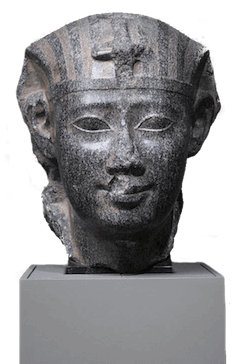Ptolemaic Kings > Ptolemy II Philadelphus
Ptolemy II Philadelphus

Background
Ptolemy II was a king of the Hellenistic Ptolemaic Kingdom based out of ancient Egypt who was responsible for many achievements including furthering the expansion of the Library of Alexandria, the completion of the Pharos Lighthouse and maintaining the kingdom his father had established. He actually begun his reign as co-regent along with his father Ptolemy I Soter for two years from 285 BCE to 283 BCE and oversaw the daily affairs in Alexandria while his father chose retirement in his final years. He was one of the most successful members of the Ptolemaic Dynasty, leaving Egypt in a much better condition than he inherited it in.

Ptolemy II Bust
Early Life
Ptolemy II Philadelphus (Greek: Πτολεμαῖος Φιλάδελφος) was one of the most notable rulers of the Ptolemaic Kingdom in Egypt, reigning from 283 to 246 BCE. His reign is often considered a golden age for the kingdom, marked by cultural flourishing, economic prosperity, and significant political and military activities. Here is a detailed overview of his life and reign:
Early Life and Ascension
- Birth and Family: Ptolemy II was born in 308 BCE, the son of Ptolemy I Soter, the founder of the Ptolemaic Kingdom, and his wife Berenice I. He was given the epithet "Philadelphus," which means "Sibling-loving," likely referring to his marriage to his sister Arsinoe II.
- Co-regency and Ascension: Ptolemy I appointed Ptolemy II as co-regent in 285 BCE, and he fully ascended to the throne upon his father’s death in 283 BCE.
Reign and Achievements
Cultural and Intellectual Flourishing:
- Library of Alexandria: Ptolemy II continued to develop the Library of Alexandria, one of the most famous centers of learning in the ancient world. The library attracted scholars, scientists, and philosophers from across the Mediterranean and beyond.
- Museum of Alexandria: He also established the Mouseion (Museum), a research institution that served as a hub for scholars and intellectuals.
- Septuagint: During his reign, the Hebrew Bible was translated into Greek, known as the Septuagint. This project facilitated the integration of Jewish culture into the Hellenistic world and was a significant milestone in the history of biblical literature.
Economic Prosperity:
- Trade and Commerce: Ptolemy II promoted trade and commerce, establishing and maintaining extensive trade networks throughout the Mediterranean, Red Sea, and Indian Ocean. This included trade relations with India and the Arabian Peninsula.
- Infrastructure Projects: He initiated numerous construction projects, including the expansion of the harbor of Alexandria and the development of irrigation systems to improve agriculture in the Nile Delta.
- Coinage: Ptolemy II introduced a standardized system of coinage that facilitated trade and economic stability within the kingdom.
Political and Military Activities:
- Foreign Policy: Ptolemy II’s reign was marked by active foreign policy and military campaigns. He pursued alliances and engaged in wars to protect and expand his kingdom’s interests.
- Syrian Wars: He was involved in the series of conflicts known as the Syrian Wars against the Seleucid Empire. These wars were primarily over control of the territories in the Levant and were characterized by shifting alliances and battles.
- Naval Power: Ptolemy II significantly strengthened the Ptolemaic navy, making it one of the most powerful naval forces in the Mediterranean. This naval dominance allowed Egypt to control important sea routes and protect its trade interests.
Domestic Policies:
- Administrative Reforms: Ptolemy II implemented administrative reforms to streamline governance and improve the efficiency of the bureaucracy. He relied on a network of Greek and Egyptian officials to manage the kingdom’s affairs.
- Religious Policy: He promoted the syncretism of Greek and Egyptian religious practices, integrating Greek gods with Egyptian deities. This policy helped to maintain stability and unity within the culturally diverse population of Egypt.
Personal Life and Legacy
- Marriage and Family: Ptolemy II’s marriage to his sister Arsinoe II was both a political and cultural alliance. Arsinoe II played a significant role in his reign, and their union was celebrated in art and coinage.
- Monuments and Art: Ptolemy II commissioned numerous monuments, temples, and public works. These constructions not only demonstrated his power but also contributed to the cultural and architectural heritage of Egypt.
Conclusion
Ptolemy II Philadelphus’s reign was a period of significant cultural, economic, and political achievements. His support for the arts and sciences, combined with his economic and military policies, helped to solidify the Ptolemaic Kingdom’s position as a major power in the Hellenistic world. His efforts to blend Greek and Egyptian cultures left a lasting legacy that continued to influence the region long after his death in 246 BCE. Ptolemy II is remembered as one of the most successful and influential rulers of the Ptolemaic dynasty.
Intellectual Achievements
Library of Alexandria
First Syrian War
Alexandria in Egypt
Pharos Lighthouse
Sources
Warning: include(/home/humanityhistory/public_html/addons/domains/alexander-the-great.org/links/people-links.php): failed to open stream: No such file or directory in /home/humanityhistory/public_html/addons/domains/alexander-the-great.org/people/ptolemy-II-philadelphus.php on line 83
Warning: include(): Failed opening '/home/humanityhistory/public_html/addons/domains/alexander-the-great.org/links/people-links.php' for inclusion (include_path='.:/opt/cpanel/ea-php73/root/usr/share/pear') in /home/humanityhistory/public_html/addons/domains/alexander-the-great.org/people/ptolemy-II-philadelphus.php on line 83